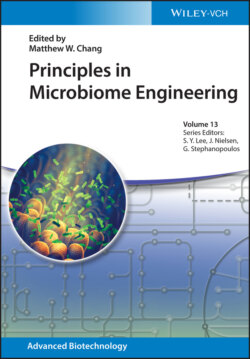Читать книгу Principles in Microbiome Engineering - Группа авторов - Страница 40
1.3.1.1 Fecal Microbiota Transplantation (FMT)
ОглавлениеThe concept of fecal microbiota transplantation (FMT) is to import the colonic microbiome from a healthy person, and transferring it to the intestine of a diseased patient to restore the microbiota (Figure 1.5) [165–167]. FMT is used in the treatment of Clostridium difficile infection (CDI), IBD, insulin resistance, and other diseases [168]. In this section, we will discuss the role of FMT in tackling CDI.
Figure 1.4 Dietary perturbation of the microbiome to improve human health. The healthy microbiome results from an equilibrium of host biochemistry and its microbiota (a). During dysbiosis, the population of certain disease‐causing microbes increases, resulting in pathogenesis (b). Using diet, it is possible to help restore balance in the host biochemistry and establish a balanced microbiota in the host. This can be achieved using prebiotics, probiotics, and nutrition to perturb the host microbiome (c). However, sustained dysbiosis will result in disease pathogenesis, resulting in the manifestation of the disease symptoms (d).
Figure 1.5 Protocol of FMT. Stool from healthy donors are screened and tested. The acceptable stool is homogenized and filtered to obtain stool slurry [165]. Fecal suspensions were given via oral capsules, through nasogastric and nasoduodenal tubes into the upper gastrointestinal tract (top), or through a colonoscope or a retention enema catheter into the colon (bottom).
Source: Based on Bakken [166].
CDI results from excessive use of antibiotics or gastrointestinal surgery, resulting in the loss of the local microbiota. Such local microbiota includes the loss of essential groups from the Lachnospiraceae and Enterobacteriaceae communities. These changes in the structure and functions of the resident microbiota reduce the resistance for intestinal pathogens, such as Clostridium difficile, to localize and propagate in the gut [169, 170]. While other pathogens can be treated with other antibiotic treatments, C. difficile can exist in three different lifestyles (planktonic, biofilm, and spore) that complicate the process of eliminating these pathogens from the gut. The ability of the microbe to evade antibiotic treatment by regulating its lifestyle often leads to recurrent CDI, where the intestinal microbiota fails to recover and thus establishing a new homeostatic balance within the host post‐initial insult. Left untreated, the pathogen can manifest in different forms including diarrhea, pseudomembranous colitis, toxic mega colon, and other symptoms, even rarely resulting in death [171, 172].
Tremendous amount of research links bacterial dysbiosis in both human and mice showed the depletion of Bacteroidetes and enrichment of Proteobacteria that are linked to a higher risk rate of acquiring CDI [173–176]. The use of FMT to treat CDI showed lower rates of recurrent CDI, leading to the recovery of the Bacteroidetes and Clostridium clusters IV and XIVa (Firmicutes) while showing depletion of the Proteobacteria populations [177, 178]. This is further proven by a study conducted on 317 patients showing 92% of patients showed complete recovery from CDI, out of which 89% exhibited full recovery after the first treatment. Only approximately 4% of patients experienced a relapse in symptoms after the FMT [177, 178]. It is mentioned from the studies above that FMT as adjunctive therapy to antibiotic treatment would be an avenue that merits further investigation.
Aside from typical colonoscopic lavage, there is increasing interest in oral delivery of encapsulated FMT. Compared to colonoscopy, oral FMT administration is considered non‐invasive, less resource intensive, easily administered, and more accessible to patients [179]. A meta‐analysis has identified that a single FMT capsule infusion has an average colonization efficiency of 80%, whereas multiple infusions showed 92% efficiency [180]. In a randomized clinical trial, orally administered FMT showed minimal difference compared to FMT lavage to prevent recurrent infection over 12 weeks [181]. Current studies are geared toward developing smart oral delivery methods to facilitate the targeted release of the microbes. Preliminary studies of FMT capsules with a targeted colonic release(FMTcr) showed better therapeutic effects compared to FMT capsules with the gastric release (FMTgr) [182].
